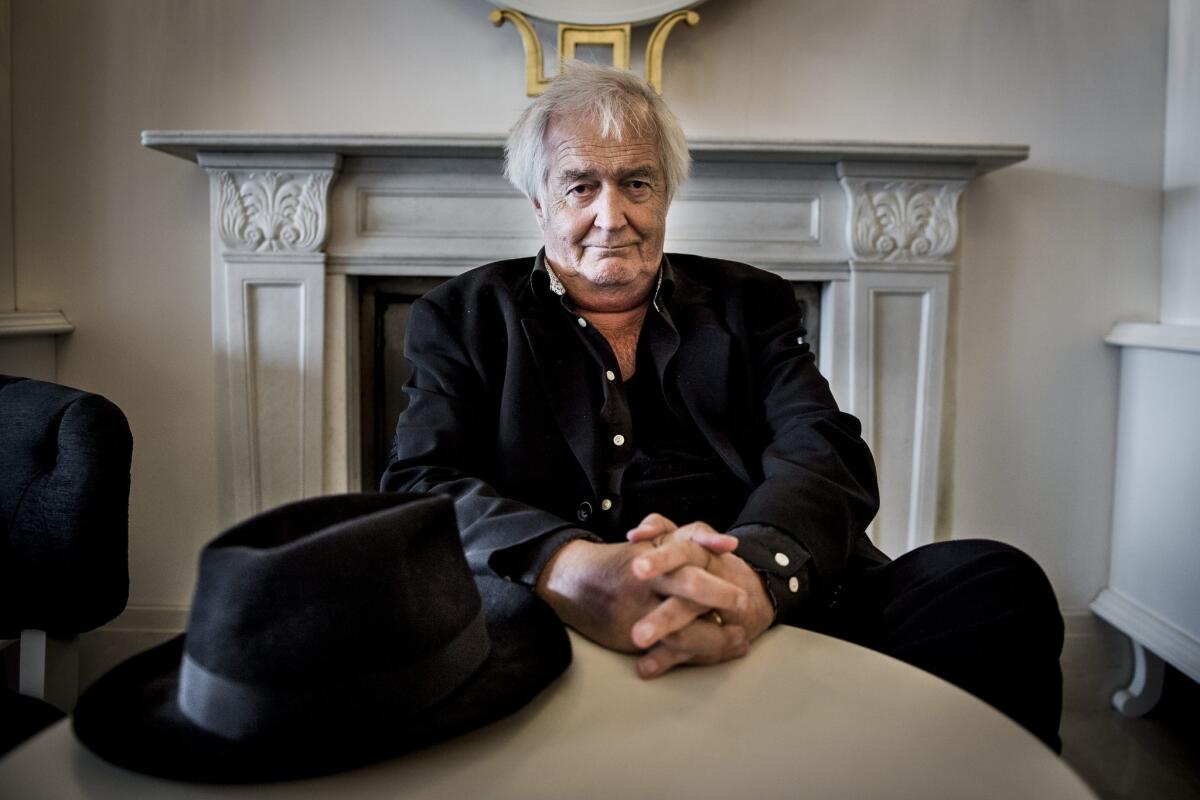Henning Mankell is gone, but he leaves enduring legacy with Wallander novels

Swedish writer Henning Mankell died Monday at the age of 67. His 10 Wallander books were adapted into the English-language television series “Wallander,” starring Kenneth Branagh.
It’s not easy for an author to catch on across borders, but Swedish crime novelist Henning Mankell did it, all on the strength of a single character.
Although Mankell wrote novels and plays about many things, he was best known for his beloved, difficult detective Kurt Wallander. His 10 Wallander books were adapted into the English-language television series “Wallander,” starring Kenneth Branagh (and were adapted separately in Sweden).
Mankell, who had publicly announced that he had cancer, died Monday at age 67. But his work -- particularly his Wallander novels -- will live on.
From the very beginning, when American readers got their first taste of Mankell’s books, they knew Wallander was something special. Here’s a taste of what our reviewers said:
In 1997, “Faceless Killers” was the first of the Wallander books to be published in America. It was “an exquisite novel of mesmerizing depth and suspense,” wrote Margo Kaufman at the time. “I confess I have a crush on the Swedish sleuth, who exhibits an appealing combination of Scandinavian melancholy and a surprising joie de vivre. The depiction of ordinary life in the Far North is exotic yet strangely familiar.”
Mankell’s books started appearing with regularity, and were reviewed for several years by L.A. Times crime columnist Eugen Weber. Mankell is “a master of atmosphere and suspense,” he wrote of “One Step Behind” in 2002. “In Mankell’s hands, a Swedish police investigation devolves into a crazy, mazy, shifty, tortuous tale of political activity interspersed with edifying passages about the problems of a South Africa that has been turned on its head in the last 10 years,” he wrote of 2003’s “The White Lioness.” In 2005, Weber still had only praise for the Swedish novelist. “Henning Mankell is an addictive writer,” he wrote, and “Before the Frost” is a “gripping, beautifully orchestrated yarn.”
By 2006, when “The Man Who Smiled” came out, Mankell was being compared to great writers, and coming out ahead. “There has long been a tendency among some Scandinavian writers (think Ibsen, Strindberg) to cast a sense of gloom over their works. Mankell, by contrast, is a master at developing varied atmospheres, creating deeply probed, vulnerable -- and hence believable -- characters, as well as devising ingenious plots,” wrote Elaine Harp. “[‘The Man Who Smiled’] is elegantly crafted and has a chilling denouement. ... Skol, Mankell!”
In 2008, Joe Queenan became a Mankell devotee after reading “The Dogs of Riga,” placing him behind only Georges Simenon and Arthur Conan Doyle. “Mankell is a deceptively gifted writer,” Queenan wrote, “who uses the plebian mystery format to address the disintegration of Swedish society, the horrors of old age, the very meaning of police work.”
Kenneth Turan was also a fan, favoring Mankell’s “much-superior novels” to Steig Larsson’s bigger-selling “Dragon Tattoo” books. “The Wallander novels get their strength from the notion of using crime novels to reflect on society and having a protagonist who ages and evolves from book to book. ... Marvelously astute about behavior and motivation, Mankell has created in Wallander a shambling central character whose unconventional personality is at least as compelling as the crimes he investigates and has become another major factor in the series’ success. A fallible and out-of-shape loner who is prone to catching colds and drinking too much, not necessarily in that order, Wallander is often put-upon and overworked. He’s a tired, grumpy but very human perfectionist whose tongue can turn biting when people exasperate him, which is often.”
“Police work is the only constant in Wallander’s life, and it’s here that he’s a master,” Turan continued. Though an investigator of formidable instinct and intuition, his real advantage is his painstaking doggedness, his willingness to sift and resift evidence until it speaks to him. It’s not so much a search for a key, Mankell explains, but rather a ‘hunting for the slightest sound of a distant tinkling from a bunch of keys.’ ... We can feel Mankell consciously saying goodbye to these people and that he will regret not writing about them as much as we will miss reading about them. Which is more, really, than words can say.”
Twitter: @paperhaus
More to Read
Sign up for our Book Club newsletter
Get the latest news, events and more from the Los Angeles Times Book Club, and help us get L.A. reading and talking.
You may occasionally receive promotional content from the Los Angeles Times.







